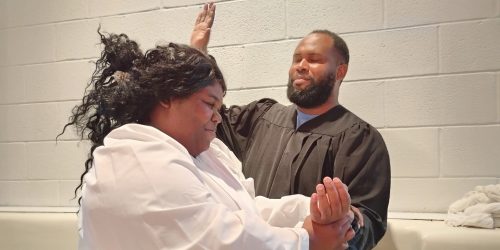
Over the course of a single week, July 20–26, the church hosted more than 200 visitors per night, held nightly evangelistic meetings paired with community giveaways, and welcomed 74 people into the Adventist church, including members’ loved ones and people from the neighborhood.
Inspired, Samuel reached out, hoping to bring the same momentum to his own Indianapolis district.
Originally intended for Muncie, the project shifted to the Eastside Seventh-day Adventist Church when structural issues closed the Muncie church. He believed the vision still had a place.
“We had the funds. We had the opportunity,” he said. “And I believed God still wanted to move.”
That’s when the Lake Region pastor cast the vision before his elders at Eastside.
“I told my members, I don’t want Pentecost 2025 to be an event that comes and passes,” said Samuel. “I want us to experience Pentecost right here.”
They did—and then some.
Over the course of a single week, July 20–26, the church hosted more than 200 visitors per night, held nightly evangelistic meetings paired with community giveaways, and welcomed 74 people into the Adventist church—including church members’ loved ones and people from the neighborhood.
To plan, Samuel turned to an unexpected source: ChatGPT. He asked the AI for the top five needs in ZIP code 46218. The answers—poverty, food insecurity, housing instability, poor health outcomes and educational gaps—shaped the Compassion Project strategy.
The church served hot meals, gave away backpacks, school supplies, groceries, diapers, toiletries, laundry supplies and clothes. Each night began with music and a message, followed by giveaways and fellowship.
Advertising was entirely digital. Facebook ads ran for nine days and generated over 1,200 sign-ups. The church hosted a Vacation Bible School complete with inflatables, sprinklers and snow cones, averaging 50 kids per night.
The entire project, including giveaways and marketing, cost about $30,000, funded through a combination of Pentecost 2025 support, Lake Region Conference evangelism funds and other donations and evangelism funds.
“We got a lot of ministry impact for what we spent,” Samuel said. “God multiplied it.”
Each evening, Twumasi preached solid biblical messages built around Seventh-day Adventist doctrine.
“Some people made decisions on the spot,” Samuel said. “We baptized every single night.”
Some questioned baptizing people so quickly, but Samuel pointed to biblical examples like Philip and the Ethiopian eunuch. “It wasn’t weeks of study—it was a response to conviction,” he said.
For each baptism, the team reviewed some of core beliefs with the candidate, including Sabbath, salvation, the state of the dead and the second coming. Then came a decision. “If they accepted Jesus and the foundation of our faith, we baptized them.”
One woman, moments after baptism, let out piercing cries—what Samuel and others saw as a spiritual release. “That reminded us why we don’t delay baptisms,” he explained. “People are seeking freedom now.”
Now What?
With the campaign concluded, the Eastside team is now focused on retention—a challenge Samuel anticipated from the start.
“We put a plan in place before the week even began,” he said. “We’re focusing on three things: social engagement, discipleship and volunteering.”
A new members class called New Beginnings starts this Sabbath [Aug. 9] at 2:30 p.m. after lunch. The weekly sessions focus on church beliefs, mission and community life. “We’ll go deeper with the Bible and the Adventist faith through interactive discussions,” Samuel said.
The church will host two socials each month, including outdoor barbecues and activities using leftover children’s ministry supplies. “We want new and longtime members to bond. I’ve seen how much people connect at church socials.”
And several new members are already volunteering, helping as ushers, assisting with food prep, and joining in Compassion Sabbath outreach.
Eastside Church usually sees about 50 attendees on a good Sabbath. Many are older. Pulling off a project of this scale, Samuel admitted, took faith—and energy.
“There were moments of frustration,” he said. “We were tired. We were overwhelmed. But it brought us together.”
Some of the most moving decisions came from within. The church’s community services director watched her adult son walk forward for baptism. An elder’s lifelong friend made his decision after working security all week. And an elder’s wife, long assumed to be a member, made her public commitment at last.
For a small church in a struggling neighborhood, the experience was more than a campaign. It was a glimpse of Pentecost.
“We asked God for a move,” Samuel said. “We wanted Acts chapter 2, and we got it.”
And as he put it simply, “We’re just getting started.”
Debbie Michel is editor of the Lake Union Herald.